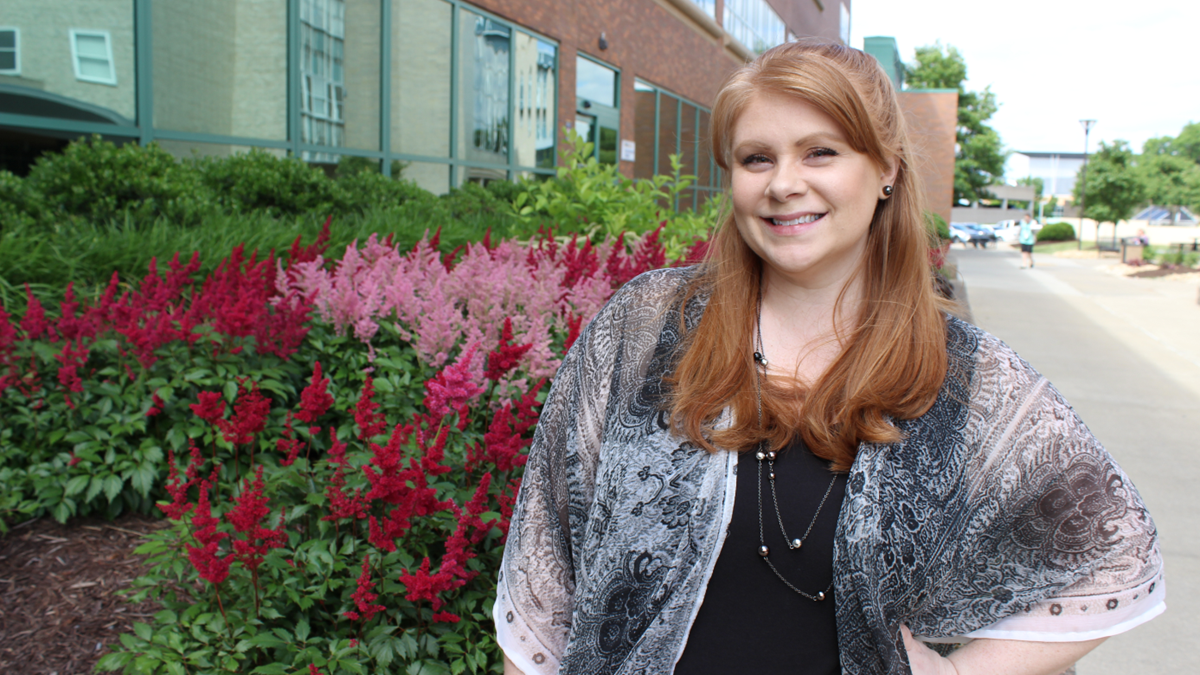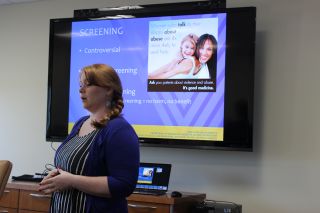Danielle Davidov

“I think there is a huge public health need here in West Virginia and I feel really passionate about staying and helping people in my home state ... For me, Morgantown is home and it’s hard to leave home.”
Teacher. Researcher. Intimate partner violence advocate. Public health professional.
All of these titles describe none other than Emergency Medicine’s Dr. Danielle Davidov.
Davidov’s journey began when she was an undergrad at Marshall University. She always thought that medical school would be the place for her, saying that dermatology seemed like it would be fun. Admittedly, she had no real passion for clinical medicine, and chemistry wasn’t exactly her strong suit–so it was back to the drawing board.
Davidov ended up choosing psychology and biology but came to another crossroad when she realized that she didn’t really want to be a psychologist.
“This sounds kind of nerdy, but one day I wrote down all of my interests and took that list to my professors to get their opinions on what I should do with my life. The list included things like women’s health, issues related to women’s sexual and reproductive health and violence against women.”
Dr. Davidov knew that she wanted to get her Ph.D. but wasn’t quite sure how to meld her interests with her area of study as an undergraduate student.
“I took the list to several of my professors who all said the same thing–public health. I had never heard of public health before but once I started researching it I realized it was the perfect fit for me. I was interested in work that had a really broad impact, which is one of the reasons why I chose this path.”
Making a broad impact is almost an understatement compared to the things that Dr. Davidov has achieved in her time here at WVU. After finishing her Ph.D. in Public Health, a position opened up in the Department of Emergency Medicine and she hasn’t looked back.
“I find working in this environment with physicians and residents to be really fun and exciting, and I love resident education.”
The Fairmont native didn’t plan to stay after finishing her doctorate but admitted, there is something about West Virginia that keeps her here.
“I think there is a huge public health need here in West Virginia and I feel really passionate about staying and helping people in my home state. I also just love the culture here at WVU. It is a pretty large campus but I feel like it’s such a tight-knit community. For me, Morgantown is home and it’s hard to leave home.”
Over the last 10 years, Dr. Davidov has taken that passion for calling West Virginia home and has channeled it into research initiatives related to intimate partner violence that truly are making a difference.
She joined WVU’s Research Center on Violence as an executive board member and uses the center as a resource when looking for research partners from other departments who are also interested in intimate partner violence.
Dr. Davidov is also an affiliate member of the WVU Injury Control Research Center (ICRC), which is where she completed her dissertation while working on a CDC funded study related to intervention of intimate partner violence within a home visitation program.
More recently, the ICRC has recognized Dr. Davidov’s strengths and passion for teaching and just recently awarded her with the “Excellence in Teaching Award,” which she earned from student nominations for her special topics course titled, "Mental Illness, Substance Abuse and Violence."
“The fact that students nominate someone for this award is what makes it so special. The students that I work with inspire me. Sometimes, you read the literature and can become discouraged or bogged down with the negativity of this particular topic but they keep me motivated. To see students so dedicated to making a change in public health and intimate partner violence is so rewarding it’s almost hard to describe.”
Originally, Dr. Davidov did not plan to study intimate partner violence; however, she witnessed the abuse of a friend and decided she wanted to learn how to help those in a similar situation.
“I saw that individual go through an abusive relationship for years without knowing what I should say or do. In fact, I probably ended up saying all of the wrong things. That’s what sparked my interest in researching this topic to find out how it can be controlled and prevented.”
Currently, Davidov is working on a project funded by the Patient Centered Outcomes Research Institute (PCORI) which funds research that promotes patient input and collaboration.
“In order to improve the way we screen patients for intimate partner violence, we thought it was important to get input from those who have actually experienced it firsthand. We’ve been working with intimate partner violence survivors and stakeholders, health care providers, social workers and people all throughout the state that have an interest in this issue. This is something I hope to continue working on for the next five years or more!”
Dr. Davidov loves not only the team she is working with, but the cause she is working for–something that most people can only hope for in a career.